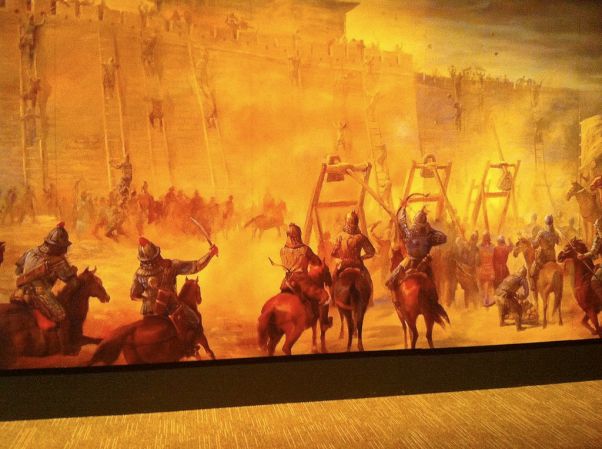Blood oaths, prophecies, and brutal life lessons propelled Genghis Khan into conquest, amassing the largest land empire in the history of mankind. As a boy, he was the illiterate son of a murdered chieftain and had everything he loved torn away from him. As an adult, through merciless leadership, he united the steppe tribes and instilled discipline into his warriors.
Genghis Khan established dedicated trade routes, promoted religious tolerance, and got so many women pregnant that you may be related to him. The effects of his rule can still be seen today and few have come close to his level of greatness or ruthlessness.
Leadership based on merit
Temüjin, Genghis Khan’s birth name, loosely translates to ‘of iron‘ or ‘ironworker.’ His leadership style reformed Mongol tradition by replacing the nobility rank structure with a merit-based promotion system. Though much of his army was “recruited” by threat of death, he earned loyalty by promising the spoils of war to his troops rather than hoarding it all himself — after all, he believed that excessive wealth was a weakness. Sure, your home and everything you knew just got rolled over by Genghis Khan, but hey, now you have the opportunity to fight by his side — or die.
The Yassa, a code of law written by Genghis Khan, and its enforcement was a non-negotiable condition of joining the Khan’s empire. Soldiers had to swear allegiance to Genghis Khan, to not steal livestock, to not steal another man’s woman, and, generally, to not be a thieving POS. You could pillage the enemies of the empire, but not the people inside the empire itself.

All hail the God Emperor
Adapt and overcome tactics
The Mongols learned mounted archery at an early age. They were taught to fire the arrow when the horse’s hooves were off the ground to achieve maximum accuracy. They adopted strategies against walls cities out of necessity because the steppes had no fortified towns. In China, the Mongols captured Chinese soldiers and tortured them until they gave them the knowledge to build the necessary siege engines.
Psychological warfare was the Khan’s bread and butter. His armies often used harassing techniques to lure the enemy into ambushes or tied sticks to the tails of their cavalry to exaggerate the size of cavalry charges. The night before battle, troops would burn five fire pits to further exaggerate their numbers.
He would give his opponents the opportunity to surrender and join him before murdering every living thing in their city. He tortured motivated his enemies to death by boiling them alive, had them suffocated, or, in the case of noble named Inalchuq, poured molten silver into the eyes and ears. Fear was an effective tactic that minimized loses in his conquest because cities would rather surrender than suffer the dire consequences.

You could keep your God, but not your shoes.
Religious freedom
History remembers the Great Khan, mostly, as a warmongering sociopath, but his views on religious tolerance have influenced our own government’s Constitution. Thomas Jefferson’s view on the separation of church and state is eerily close to the Mongolian warlord’s idea of unifying the tribes (and subsequent territories), regardless of faith and orienting them toward greater ambitions.

Kill all humans.
Safe trade routes
His protections also extended to merchants traveling within his empire in what is now known as the Pax Mongolica (Mongol Peace). Some accounts go as far as to say that a maiden bearing a nugget of gold on her head could wander without fear throughout the realm.
Alpha male genetics..?
Women’s rights
Let’s set something straight first. The Great Khan has 16 million living descendants as a direct result of his empire. And it was common for him to take many women from the vanquished. He, himself, was certainly not kind to women in general.
But his social policies supported women’s rights and, to this date, affect a woman’s role in Mongolian society. Though women were still subordinate to men in Mongol culture, they were less subdued than in other civilizations of the time. In fact, Sorkhaqtani, the wife of one of Genghis’ sons, was a trusted advisor played a crucial role in holding the empire together.


















